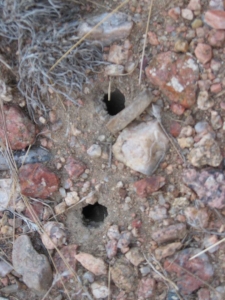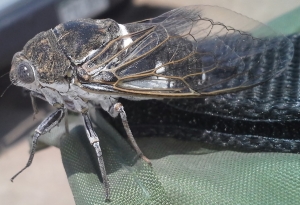Cicadas are large, robust insects most commonly know for the species that have periodical emergences causing mass population outbreaks at set intervals of 13 and 17 years. Not every species of cicada follow these patterns however and none of which inhabit our state. In Colorado, cicada often take two to five years to complete development. There are twenty-six species of cicada that occur in the state with the largest measuring roughly 2 inches in length. Despite their size, cicada rarely cause damage. Nymphs grow slowly, below ground where they feed on the sap of various trees, shrubs and other plants. When they emerge from the soil they climb the stem or trunk of a near by tree or shrub and then shed their nymph skin by splitting it down the back and crawling out. The adult then hangs upside down and begins to pump blood into the veins on their wings. This process can last for several hours; however, the exoskeleton hardens and darkens rapidly. Large holes can often be seen in the soil following the emerging of cicada and are a characteristic sign of the presence of cicada in the area.
Cicada are often mistakenly referred to as locusts, which are actually a group of migratory grasshoppers. The reason for this mistaken identity is the male cicada’s songs that they utilize to attract females. While the shrill buzzing sound may not be considered music to human ears, it works well for attracting female cicada. Theses songs are produced by either tymbals (drum-like organs on the sides of the abdomen) or by clicking their wings like certain species of grasshoppers and crickets. Adults are present for several weeks during the summer in which they breed and females lay eggs. Control programs have not been established for cicada due to the fact that they rarely cause damage and the little damage that they may cause is not significant enough to warrant control measures to be considered. Natural predators include the Cicada Killer Wasp, smaller parasitic wasps and the Mississippi Kite (a large predatory bird that has extended their range into the Arkansas Valley area of Colorado).

